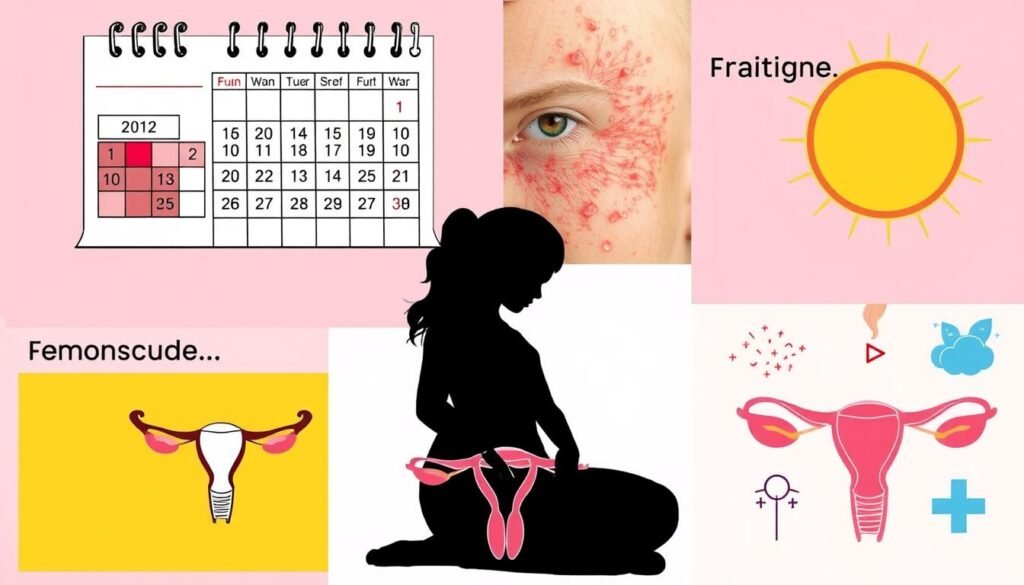Did you know Polycystic Ovary Syndrome (PCOS) affects about 6-12% of women who can have babies? This big number tells us menstrual issues are very common in PCOS. The main cause is hormonal imbalances. These mess up how the ovaries work. This leads to many symptoms that can hurt a woman’s health a lot.
It’s important to know how PCOS and menstrual problems are linked. This helps find the issue early and manage it well. Period problems can vary a lot, from rare periods to very heavy bleeding. The reasons for these differences include changes in hormones, lifestyle, and other health issues. You can learn more about PCOS by checking out these resources.
Knowing about these symptoms is key. It helps women get care early. Catching these signs early can lead to quick doctor visits. This is super important to handle this complex problem well.
Key Takeaways
- PCOS impacts 6-12% of women of reproductive age.
- Menstrual irregularities are a primary symptom of PCOS.
- Hormonal imbalances often lead to various menstrual issues.
- Understanding symptoms can aid in early diagnosis.
- Active monitoring can improve management of irregularities.
- Healthcare support is essential for effective PCOS management.
Understanding Polycystic Ovary Syndrome (PCOS)
Polycystic Ovary Syndrome is a hormonal issue seen in many women, mainly during their teens or early adulthood. It triggers a variety of PCOS Symptoms that upset the normal reproductive cycle. Women with this condition often have irregular periods, high androgen levels, and several cysts on their ovaries.
Those with PCOS also deal with hormonal imbalances, including insulin resistance. This can cause weight gain and a higher chance of getting type 2 diabetes. Knowing about these aspects is crucial since PCOS can lead to serious health issues like heart disease and certain cancers, including endometrial cancer.
Understanding PCOS helps people to manage their health better. Being informed means better control over the PCOS Symptoms and related problems. It shows why learning about this common condition is so important.
Menstrual Irregularities and Their Impact on Women’s Health
Changes in menstruation greatly affect a woman’s health. They touch every part of her life – physical, emotional, and mental. Irregular periods can make it hard to predict ovulation, which complicates family planning.
Some women go through a tough time. They face emotional stress, anxiety, and sometimes depression. This is because of their unpredictable cycles.
Issues like amenorrhea, dysmenorrhea, and menorrhagia often go hand in hand with menstrual irregularities. These conditions can make emotional stress worse. They can lower the quality of life. In cases like PCOS, hormonal issues make things even more complicated. This cycle is hard to break. It affects menstrual health and can lead to weight and metabolism problems.
We must understand how these changes in menstruation affect women’s health. Looking closely at these issues is key to improving women’s health care. Finding and treating the root causes can help women feel much better.
| Impact Area | Description |
|---|---|
| Physical Health | Irregularities may lead to complications such as weight gain or loss. |
| Emotional Health | Inconsistencies in cycles can cause emotional stress and issues like anxiety or depression. |
| Reproductive Health | Challenges in predicting ovulation can hinder family planning efforts. |
| Long-term Implications | Hormonal imbalances related to PCOS can contribute to chronic health conditions over time. |
Types of Menstrual Irregularities
Menstrual irregularities are a wide range of symptoms that many women experience. They include issues like amenorrhea, menorrhagia, and dysmenorrhea. Knowing about these types helps in finding out what’s wrong and how to treat it.
Amenorrhea
Amenorrhea means not having a period for three or more cycles. It can happen due to lots of reasons like losing a lot of weight, stress, or using birth control. Women with Polycystic Ovary Syndrome (PCOS) may not have periods because of not ovulating regularly. It’s important to see a doctor if this happens, as it might point to a bigger health problem.
Menorrhagia
Menorrhagia is when periods are very heavy or last a long time. This can make life tough and cause issues like anemia and tiredness, especially if you have PCOS. Hormones that aren’t balanced can cause this problem. Women who have these symptoms should talk to a doctor to find out what to do next.
Dysmenorrhea
Dysmenorrhea means having really bad cramps during your period. It can make it hard to do everyday things. A lot of women with PCOS feel more pain and discomfort when they have their period. Managing this pain might include changing your lifestyle or getting medical help. Knowing about dysmenorrhea helps in dealing with it better.

Getting to know about menstrual irregularities is key. They could show there’s a health issue that needs attention. Understanding this can lead to faster help and better health.
Hormonal Imbalances Contributing to Menstrual Irregularities
Hormonal imbalances are a big reason why many women face menstrual issues, especially if they have PCOS. These imbalances can lead to various health problems. It’s key to know what causes them.
Insulin Resistance
When cells don’t react well to insulin, insulin resistance happens. This causes insulin levels to go up. These high levels make the ovaries create too many androgens, affecting periods. This also leads to weight gain and problems like acne and irregular cycles.
Androgen Excess
Both men and women have androgens, like testosterone, but women normally have less. For some women, their bodies make too many androgens. This excess can cause issues like excess hair, acne, and messed up periods. Knowing about these hormones helps us understand PCOS and menstrual problems better.

Identifying Other Symptoms of PCOS
Polycystic Ovary Syndrome (PCOS) has many symptoms beyond menstrual problems. Learning about PCOS Symptoms helps women get the right help. One common sign is hirsutism, or too much body and facial hair.
Many also struggle with acne, skin tags, and extreme tiredness. These issues make everyday life harder.
Besides, many women gain weight due to insulin resistance. This problem makes it hard to lose weight and worsens other PCOS Symptoms. Issues with fertility are common too, as some women have trouble ovulating.
It’s crucial to check these symptoms for a correct diagnosis and treatment. Managing these symptoms well can greatly improve Women’s Health. For more on PCOS symptoms and causes, check out this resource.

| Symptom | Description |
|---|---|
| Hirsutism | Excessive hair growth on face and body |
| Acne | Frequent breakouts on face and body |
| Skin Tags | Small growths of skin, often in folds |
| Fatigue | Persistent tiredness and low energy levels |
| Weight Gain | Increased difficulty in losing weight |
| Infertility | Challenges in conceiving due to ovulatory dysfunction |
Associated Conditions: Endometriosis and Uterine Fibroids
Women with PCOS often face higher risks of endometriosis and uterine fibroids. Understanding these connections is key for managing menstrual issues effectively.
Endometriosis is when tissue like the uterus’ lining grows outside it. This growth can cause severe pelvic pain during periods. For women with PCOS, this pain can be worse, along with more intense menstrual problems. This overlap in symptoms means careful evaluation and treatment are important.
Uterine fibroids are non-cancerous tumors in the uterus causing heavy bleeding and pain during periods. PCOS-related hormone changes can increase these fibroids’ growth. It’s important for women with PCOS to watch for changes in their menstrual cycle.
Managing PCOS well means understanding its related conditions. The link between endometriosis, uterine fibroids, and PCOS highlights the need for women to learn and talk with doctors. For more on PCOS and how to manage it, check out this resource.
Management Strategies for Menstrual Irregularities
Dealing with menstrual irregularities involves combining lifestyle changes with medical treatments. These adjustments help ease symptoms and improve health.
Lifestyle Changes
Regular exercise improves insulin sensitivity and hormone balance. This is key for women with irregular periods. A healthy diet with whole grains, lean proteins, fruits, and vegetables is also important.
Keeping a healthy weight is crucial. Even a small weight loss can make menstrual cycles more regular. Managing stress with mindfulness or yoga helps too.
Medical Treatments
Some need medical treatments to handle menstrual irregularities. Birth control pills are often given to regulate cycles. They provide a constant hormone level.
Anti-inflammatory medicines can reduce period pain. Metformin helps those with PCOS by improving insulin sensitivity. This leads to regular periods. For those wanting to get pregnant, fertility treatments are available.
Seeking Professional Help: Diagnosis and Treatment Options
Getting Professional Help is critical for women facing menstrual issues like PCOS. Doctors will do a detailed Diagnosis. This includes physical checks, blood tests for hormone levels, and ultrasounds. These steps are crucial to find what causes menstrual problems.
After evaluating everything, healthcare providers tailor Treatment Options. They may suggest changing your diet and exercise, or take specific medicines to balance hormones or ease pain. Regular check-ups help adjust treatments to better manage symptoms.
Women noticing menstrual cycle changes should talk openly with their doctors. This conversation can lead to better care that combines Diagnosis and Treatment Options. It ensures women get the best support for their health. For more on treatments, visit this resource.
Conclusion
Menstrual irregularities are a key part of PCOS that affect a woman’s health and life quality. They can cause a lot of discomfort and emotional upset. It’s important to connect these issues with PCOS to manage them well.
Making healthy choices in life can greatly help. This includes eating right, staying active, and handling stress. Seeing doctors for care is also key. They can make treatment plans for PCOS and its effects. This approach helps deal with menstrual problems better.
Knowing more and getting support can lead to improved health. Talking to experts and using good resources helps those with menstrual issues stay strong against PCOS. Being active in managing health is vital for the best outcomes in women’s health.